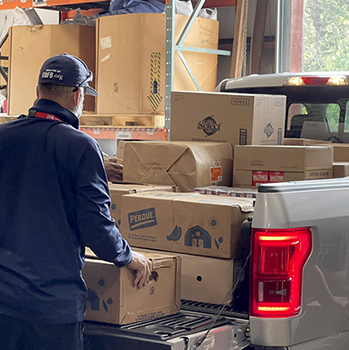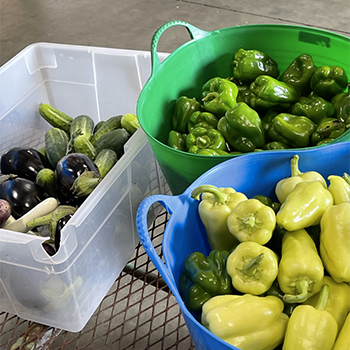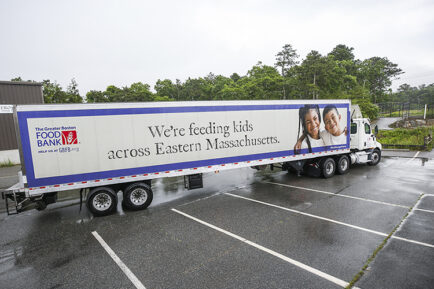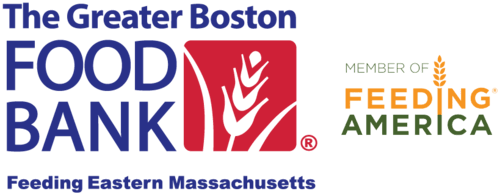Being a part of the solution
Nantucket, Home of soft sands, high end homes. And food insecurity?
Part Four: Being a part of the solution.
How does the Greater Boston Food Bank fit as part of the solution?


The Greater Boston Food Bank serves over 20 locations throughout Cape Cod and the islands of Nantucket and Martha’s Vineyard. The partnership with GBFB is crucial to pantry livelihoods — and the hundreds of visitors that rely on the fresh produce, lean proteins, and shelf-stable items acquired and distributed every week.
As part of our network that helps extend our reach across Eastern Massachusetts, GBFB operates several “cross-dock” sites where agencies can travel to pick up their items at a shared location.
On a strict schedule to ensure efficiency, GBFB-branded trucks deliver high-quality food to strategically placed depot stations every day of every week.
The entire fleet of GBFB trucks is refrigerated. The tractor-trailer delivery trucks that make their way to the Cape Cod cross-dock in Harwich carry 42,000 lbs of food each: fresh, frozen, canned, and dried. An average of 32,000 lbs. is delivered to the Harwich cross-dock site every week. It can go as high as 50,000 lbs. in the winter to ensure agencies across the Cape and Islands can meet the need.
The Nantucket Food Pantry picks up 4,200 lbs. of food every other week, totaling 8,400 lbs. a month. This is what their van allows, and Yeshe Palmo, manager of the Nantucket Food Pantry and the one who makes the journey by ferry for the delivery, will “pack it to the max” every time.
At cross-dock sites operated by GBFB, each pantry has a time slot to arrive and pack their vehicles with the food items they have requested from GBFB’s central warehouse.
Building this process with our hunger-relief partners and fleet of trucks, beginning with acquiring and distributing quality food at low prices and ending with clients across Eastern Massachusetts having a nutritious and fresh meal, has been a bit of pride at GBFB. Although strong, the process does remain fluid to ensure no one gets left behind. GBFB Team Members are consistently reviewing agency needs and transportation routes to ensure maximum coverage.
In addition, GBFB conducts research and analyzes data on our operations and our community to improve our effectiveness and public health in the Commonwealth. Our findings are used to guide GBFB’s strategy and to inform policy and advocacy at the local, state, and federal levels.
During the peak of COVID-19, GBFB was part of national research in collaboration with the National Food Access and COVID Research Team (NFACT) to identify hunger in real-time and make sure that the right amount of food gets to our neighbors in need. According to the study, “Gaps in Food Access During the COVID-19 Pandemic in Massachusetts,” the researchers estimated that 30 percent – or 1.6 million adults in the state – were experiencing food insecurity at the time of the survey.
Despite this, only 1 in 3 reported using food pantries and 1 in 2 reported using SNAP. Among others, a desire for self-sufficiency was cited as the number one reason for not using food pantries and the number two reason for not participating in SNAP. Those who did use pantries felt positive about their experiences, reported feeling welcome, and that the food was of good quality.
The statewide survey was not only conducted to identify the prevalence of food insecurity, but to use this feedback to develop data-driven recommendations to increase food access.
These include both programmatic and policy recommendations, such as creating a public awareness campaign to reduce stigma and overcome barriers to access with sectors like healthcare, school systems, and retailers, and prioritizing federal food and financial assistance policies and infrastructure investments that will reduce food insecurity and poverty equitably.
“The COVID-19 pandemic created historic need and unprecedented challenges, at levels unseen during my 25 years leading The Greater Boston Food Bank,” said Catherine D’Amato, GBFB President and CEO. “The results of the study reflect what we already experienced – that the need jumped dramatically and continues to disproportionately impact people of color. While we, and our network of community partners, are inspired and energized by the progress we have made to combat the pandemic, the economic effects will linger indefinitely for those who are suffering from long-term unemployment. There is much more work to be done.”
But we are ready for the challenge because, together, we can end hunger here.
